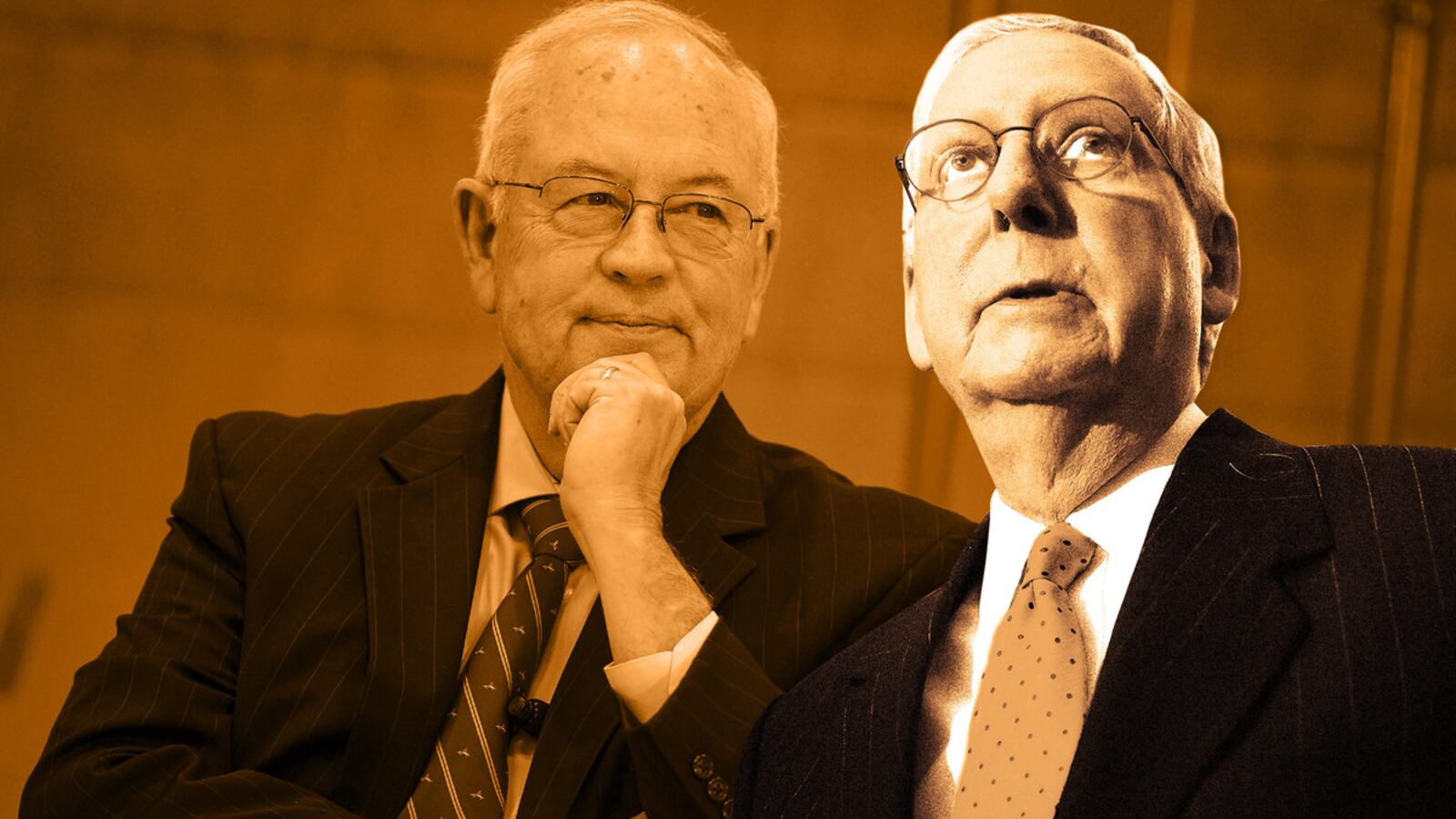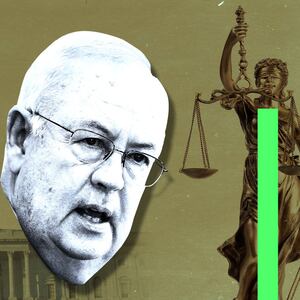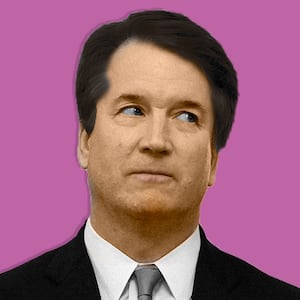During the impeachment of Bill Clinton, Ken Starr, now one of the major new additions to Donald Trump’s legal team, argued that a president under investigation for criminal conduct must not be permitted to use governmental authority to embargo witnesses or hide the evidence against him. Starr’s arguments before Congress as a prosecutor decades ago apply directly to the upcoming Senate trial of Donald Trump, and the assiduous efforts of Mitch McConnell and his fellow GOP Senators to engineer a sham trial.
Start with McConnell, who for weeks has insisted that the Senate will “exactly” follow the procedures employed during the trial of Bill Clinton. Under those rules, the Senate formally admitted into evidence the entirety of the extremely comprehensive record assembled by Starr’s team, and then decided whether to call additional witnesses after the parties presented their opening arguments and answered questions from the legislators.
Given that Trump has schemed to withhold potentially key witnesses and evidence, leaving the record far from complete, following the “Clinton Rules” in the Trump case makes little sense. Furthermore, on the eve of the trial Monday, McConnell laid out his proposed rules, which do not follow a key provision of the Clinton procedures. Instead of automatically admitting the House’s materials into evidence, McConnell proposes that the Senate vote on which portions, if any, of the documents and testimony assembled by the House to admit. Under the McConnell Rules, which a Republican majority is near certain to pass, the Senate will literally be able to reach a verdict without admitting any of the materials incriminating the president into evidence.
The rules are also shaped in other ways to shut down and block out Democrats, but opinion polls show that the public isn’t likely to be fooled here. Whether or not the Senate votes to formally admit the highly inculpatory materials gathered by the House, the Senators, and, more importantly, the nation already already know that the evidence exists.
One person who has long argued that Congress should have all of the relevant evidence before it when deciding an impeachment case is Ken Starr.
In 1994, Starr was selected by his former colleagues on the D.C. Circuit appellate court to serve as the Independent Counsel charged with investigating Clinton. Along with future Justice Brett Kavanaugh and other members of his team, Starr spent years in an Inspector Javert-like effort to find some misconduct that could justify the impeachment of the president, finally latching onto a case grounded on Clinton’s lies about sexual activities.
Despite the pettiness of Starr’s case against Clinton, the prosecutor advocated an important principle that the Supreme Court had articulated when it ordered Nixon to turn over the Watergate tapes: A president under investigation for violating his oath of office owes the nation nothing less than full and complete candor and disclosure.
Starr’s determination to obtain every last iota of evidence regarding Clinton’s lies about his sexual history was resolute and uncompromising. His team threatened Monica Lewinsky with jail time to pressure her into testifying about her sexual relationship with Clinton. Starr also demanded the right to review every potentially relevant document, as well as to interrogate every witness, with information even tangentially related to Clinton’s sexual misconduct.
Starr also insisted on examining Clinton under oath, despite the fact that Starr’s team had assembled the relevant evidence concerning Clinton’s relationship with Lewinsky long before the president testified. Furthermore, Starr’s report to Congress suggested Clinton might properly be impeached in part because he delayed his testimony, or because he refused to answer wholly gratuitous questions demanding details regarding his sexual activities (a memo released in connection with Kavanaugh’s recent confirmation disclosed that the future Justice was particularly interested in seeing Clinton being forced to answer such questions, largely in order to humiliate him).
In stark contrast to Clinton, Trump flatly refused to testify in person in the Mueller investigation. Furthermore, the president has embargoed the testimony of key current and former administration witnesses during the House’s Ukraine investigation; indeed, the only administration witnesses to appear have done so in flat defiance of White House instructions. That leaves it to the Senate to decide whether to subpoena remaining key witnesses, including acting Chief of Staff Mick Mulvaney and former National Security Adviser John Bolton. McConnell is doing everything he can to keep that from happening.
But under the standard Starr set decades ago, that should not be tolerated.
Given the sheer weight of the incriminating evidence that has continued to appear since the House impeached Trump, GOP senators like Susan Collins may be forced by political reality to demand that the Senate hear from some witnesses during the upcoming trial, despite McConnell’s aggressive jiggering of the rules in an effort to prevent or limit such a development. Yet even if witnesses do appear, Collins is doing his level best to shape a sham proceeding, with the thinnest veneer of probity. We know he and Collins are capable of engineering a mechanism to hide the truth even if witnesses appear in the chamber, as the nation saw in the absurdly truncated “investigation” of sexual assault allegations against Kavanaugh.
In the impeachment proceedings, the White House has not only embargoed witnesses, but has also categorically refused to provide Congress with documents regarding the president’s Ukraine extortion scheme; indeed, most such materials have emerged only through cooperating witnesses and responses to Freedom of Information Act requests from the public, along with a few leaks. Without internal White House communications, including from the Office of Management and Budget, which was headed by, and reports to, Mulvaney, as well as documents and communications from Bolton and his staff, it will be challenging for House Managers to formulate the right questions, let alone establish when mendacious witnesses like Mulvaney are lying.
Despite the McConnell Rules, the Starr Standard leaves no room for such presidential gamesmanship. Under it, the Senate cannot allow a president to leave the Managers without access to the documents and materials required to test the veracity of the executive branch witnesses they question.
Withholding documents is not the only means of presidential gamesmanship Trump can employ to render the questioning of witnesses ineffective. If individuals with additional direct knowledge of Trump’s involvement in the scheme appear before the Senate, Trump has already threatened to invoke executive privilege and demand that they categorically refuse to answer questions regarding their communications with him concerning the Ukraine scheme.
We have seen this occur time and again on Trump’s watch. For example, former campaign aide and Trump confidant Corey Lewandowski refused to answer questions about the president’s efforts to engineer the firing of Special Counsel Robert Mueller, claiming executive privilege, despite the fact that he never served in the Trump administration and that his account of the events had been detailed in the Mueller Report.
Starr once made clear that such gambits are wholly unacceptable. During the Clinton investigation, Starr’s ire was raised when Clinton initially invoked the executive and other purported privileges in an effort to limit the testimony of certain witnesses—even though the president ultimately withdrew his privilege claims and allowed the witnesses to testify unimpeded.
In the legal section of the Starr Report, reportedly authored in part by Kavanaugh, Starr suggested that Clinton merited being impeached simply on account of the delay caused by his temporary invocations of privilege. Starr reiterated this position during congressional testimony, asserting that Clinton had “misused presidential authority” by trying to conceal “relevant evidence,” and that his efforts to hide facts were inconsistent with the conduct of prior presidents.
Although Starr is wont to present himself as a man of principle, it is probably unrealistic to expect him to advise his client to end the stonewalling and permit the witnesses to testify without specious invocations of privilege.
But if Starr’s new client does not relent, the Senate itself has a potential remedy to at least part of the problem at hand, since it could reject Trump’s invocations of executive privilege without risk of Trump further tying up the proceedings in the courts.
This is because Trump’s Justice Department has argued in two recent cases before the appellate court on which Starr once sat that neither the president nor Congress can resort to the courts to resolve a dispute over the effectiveness or scope of congressional subpoenas to the executive branch. Furthermore, in an impeachment trial, a simple majority of the Senate can resolve evidentiary disputes.
Accordingly, if the president invokes executive privilege in an attempt to prevent Bolton from testifying about what he has called the White House “drug deal,” it will be within the sole purview of the Senate to decide whether to follow settled law dating from the Nixon decision that the privilege cannot be used to shield potentially criminal conduct, and reject Trump’s privilege assertion.
The fact that the Senate has ample power to respond to much of Trump’s recalcitrance hardly means that it will. Just as Starr is unlikely to live up to the high standards he set during the last presidential impeachment, McConnell, Collins and their GOP colleagues in the Senate appear determined to violate their oaths of impartiality and probity as jurors.
Yet, if the Senate does repudiate its constitutional obligations and collaborates with Trump in conducting a fraudulent trial, then the presence at the defense table of Starr—who once resolutely demanded that another president satisfy his duty of disclosure to the nation—will make the Republicans’ culpability all the more inescapably evident to the nation during this election year.
Furthermore, if McConnell, working hand-in-glove with Trump, ultimately succeeds in engineering his desired sham trial, the House can, and should, continue its own investigation, and demand that the additional documents and witnesses that the Senate chose not to seek ultimately come to light.








